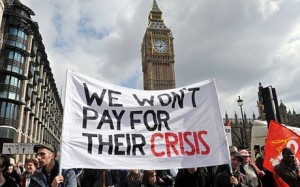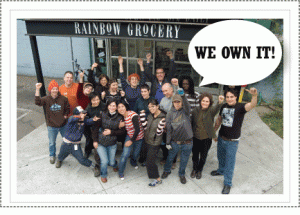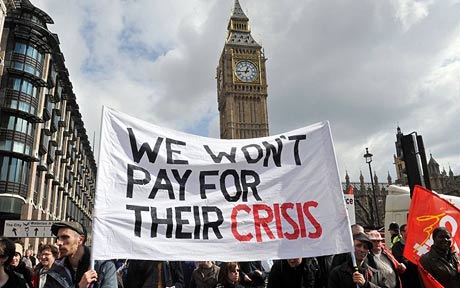By Sheldon Greaves
“Whenever the legislators endeavor to take away and destroy the property of the people, or to reduce them to slavery under arbitrary power, they put themselves into a state of war with the people who are thereupon absolved from any further obedience.” –John Locke
 Occupy Wall Street’s defining outrage was the statement it made by where it took place. OWS stated implicitly and explicitly that Washington, DC though full of sound and fury, signifies nothing. The nation’s true political center of gravity is no longer Washington, but Wall Street. The implications are frightening; an unelected, hyper-powerful oligarchy now wields vast unimpeachable power, with no accountability or even any expectation or obligation to govern. Instead, they rule for power’s sake, serving only their own unenlightened self-interests, expanding their power even further and deeper into our lives.
Occupy Wall Street’s defining outrage was the statement it made by where it took place. OWS stated implicitly and explicitly that Washington, DC though full of sound and fury, signifies nothing. The nation’s true political center of gravity is no longer Washington, but Wall Street. The implications are frightening; an unelected, hyper-powerful oligarchy now wields vast unimpeachable power, with no accountability or even any expectation or obligation to govern. Instead, they rule for power’s sake, serving only their own unenlightened self-interests, expanding their power even further and deeper into our lives.
Financial corporations hardly even make a pretense of their intended purpose, which is to facilitate activity in the rest of the economy. They are now the end rather than the means. They can rake in vast profits even when the rest of the economy literally crashes. Wall Street is above the law, as the recent testimony of Jamie Dimon proved as he preened in front of sycophantic members of Congress when he should be facing at least a criminal investigation. “Innovations†such as High Frequency Trading (HFT) are now the norm, responsible for between 50% and 70% of the activity seen on markets today. These microsecond-long trades are just one of many factors that changed the financial markets into a rigged casino that can ruin small investors, or entire nations. And yet this risky behavior has no negative consequences for its perpetrators, who know that there is no disaster they can cause that will rebound to impact them in any way; their servants in government are there to bail them out and deflect calls for accountability.
As Elizabeth Warren pointed out recently, the game is rigged and everyone knows it. The Big Boys on Wall Street are calling the shots. Rules are for suckers.
There is a pattern to the outrages heaped upon us by the 1% and their enablers. Whether it is voter suppression, dismantling the social safety net, degrading the education system, union-busting, seeking to constrain the internet, pilfering pensions, incarceration for profit, rampant foreclosure fraud, propaganda masquerading as news, an increasingly oppressive security regime, compromising our food supply and the environment, or just about any other act that raises the blood pressure of those paying attention, there is a common thread.
Each of these indignations has the effect of destroying the very idea of the social. They divide the larger population, isolating us or, worse, pitting us against each other. The loss of accountability to society is part of this; Phil Tetlock explained the role of accountability as:
“…[the] explicit expectation that one will be called upon to justify one’s beliefs, feelings, or actions to others,” coupled with an expectation that people will reward or punish us based on how well we justify ourselves. When nobody is answerable to anybody, when slackers and cheaters go unpunished, everything falls apart.â€
Democracy cannot survive if we cannot be accountable to each other for what we do, and now we see that the very concept of justice is under sustained attack as some of history’s most profligate criminals stand zero chance of seeing the inside of a courtroom. Instead, they are all but deified.
Why is this happening? Part of the reason is increasingly willful ignorance on the part of the 99%. Far, far too many of us remain wrapped in complacency, soothed by advertising and moralizing of a culture that exists to keep us in our place. We are mollified by the assurances of future “growth” or the anodyne of relative affluence. Big business has succeeded in inverting people and property. As a commenter to a blog post on the Citizens United decision put it, “Justice Taney declared that Dred Scott, a person, is property. Justice Roberts declared that corporations, property, are persons. If a decision requires denial of reality, it’s wrong.” If people can be made to believe that corporations are people, they can be made to believe anything.
Another cause of behind the crisis is the shamelessness by which the ultra-rich have begun to flex their muscle, aided and abetted by the politicians and judges they have bought. As the corrosive influence of corporate excess grows, the political establishment remains gridlocked or focused on non-issues hoping to distract and divide those still paying attention, posturing (they hope) their way toward re-election. But the political establishment can no longer encompass the problems set before it, particularly those that stem directly from the seizure of power by corporate interests.
Some of us can start to see with increasing, terrible clarity, the kind of society that would replace the one they are dismantling around us. It is one in which the needs of Wall Street and the War on Terror have replaced the Constitution as the model and metaphor for governance. Leaked details of the super-secret Trans Pacific Partnership “trade deal” propose essentially a global corporate government, where national sovereignty and laws are subordinate to corporate interests and rule, thanks to its own, wholly owned and controlled court system.
It comes to this: money is the medium, and the message is power.
Where has this taken us? It is now impossible to afford a two-bedroom apartment anywhere in the US on a 40-hour, minimum wage job. 15% of Americans live in poverty, but if you include those who are just one financial shock away from poverty, the number soars to 50%. More and more people cannot afford their own living space. From 2007 to 2010, the number of shared households rose by 11.4%, while the total number of households rose by 1.3%. A record number of Americans now need Food Stamps just to eat. Some 50 million are without health insurance, with tens of thousands still dying each year from curable illnesses because they can’t afford health care. Far more descend into bankruptcy due to unpaid medical bills. Long-term unemployment is at unprecedented levels, particularly for young people, who can expect to see their future earnings reduced significantly for years afterwards. Upward mobility, the lifeline of hope to so many of America’s poor, has all but ceased to exist. The numbers now show that if you start out poor, you will stay poor, or grow poorer.
What to Do?
The traditional response to such excess was to enact regimes of regulation and controls to hold the rich and powerful in check. But those interests have found ways to outflank the regulations and tame the agencies meant to regulate them. Most people who know anything at all about Washington understand that the bankers basically own that town.
Worse, as stated, the problems are now too big, too pervasive for traditional politics to comprehend. The political system is largely compromised by the massive flow of money, media, and a weak, feckless centrist party masquerading as the opposition. An important lesson of the failed Wisconsin recall election is that while we must continue to be politically engaged, we do so at a distinct disadvantage so long as we employ traditional political channels, where we must play the game on the plutocracy’s terms.
According to a growing number of knowledgeable observers, our nation is pregnant with revolt. The popularity of Occupy Wall Street was a shock to those who think they know the score, and in spite of a concerted effort to downplay its effectiveness and even its continued existence, it remains a latent, powerful force. It will be back.
Fiscal Disobedience
One segment of the Occupy and related movements has been the use of direct action to keep fraudulent foreclosures from going forward. Protests against illegal foreclosures, or even against foreclosures of any kind where the banks have failed to work with the client are not new. Even before the American Revolution there were mass protests against unfair economic practices. Protesters would occupy debtors’ courts and disrupt the judicial proceedings. They would physically block roads to keep local officials from repossessing a home. There were instances of breaking into jails and rescuing prisoners held on debt charges. Sitting on juries in a debt trail, they would refuse to convict. This is part of our collective heritage. It deserves a wider, deeper revival.
A stunning counterexample to the inexorable rise of corporate power is the success of driving advertisers away from hate-radio jockeys such as Rush Limbaugh, corporate legislation “bill mills” such as ALEC, and “think tanks” like the Heartland Institute. Shining light on their mission and nature has had profound effects. Limbaugh has lost millions in advertising, ALEC and Heartland’s power and credibility is much lower than it once was. While they can disband and reform under new names, they are still vulnerable to the same tactics, especially if it becomes clear that they are just the same emperors wearing different clothes.
In the corporate mind, money is the medium and the measure of all things. If you can cost them money, you’ve found a weakness.
Fiscal disobedience means loudly and frequently calling out the wealthy elite on their hypocrisy, their cheating, scams, criminal behavior, and disregard for anything that isn’t making them money. They crave deference, ironically, even from the smallest of us. Don’t give it to them. Treat them like the pariahs they are. Learn how they game the system, and educate those around you relentlessly.
 Fiscal disobedience refuses to play along with the rules we are given. If the Barons of Wall Street can flout rules, so can we. If you are unemployed or underemployed, conventional wisdom holds that your new job is to find your next job. Yes, do look for work to the extent that it makes sense, but your real job is to bring down an unjust system and replace it with something better. While the plutocracy unravels the very concept of the social and the public commons, fiscal disobedience means weaving it back together. Local organizing, whether it is to form a protest or plant a vegetable garden or start a reading club or common security club, strengthens our ties to each other.
Fiscal disobedience refuses to play along with the rules we are given. If the Barons of Wall Street can flout rules, so can we. If you are unemployed or underemployed, conventional wisdom holds that your new job is to find your next job. Yes, do look for work to the extent that it makes sense, but your real job is to bring down an unjust system and replace it with something better. While the plutocracy unravels the very concept of the social and the public commons, fiscal disobedience means weaving it back together. Local organizing, whether it is to form a protest or plant a vegetable garden or start a reading club or common security club, strengthens our ties to each other.
To engage in fiscal disobedience is to flout a mentality instilled in each of us over many years at great cost. We must rebel against a culture and convention even more than breaking unjust laws, particularly when that resistance keeps money from moving up and outside the local business environment. We must continue to support local, county, and state actions that dispute the legitimacy of corporate personhood or the ability of corporations to disregard local welfare in their pursuit of profits, even when they have the law on their side. The virtual dictatorship that has emerged in Michigan based on corporate-sponsored legislation is an example of this, and must be fought.
Small scale, worker-owned businesses, publically-owned enterprises are making a quiet comeback in America. Once a taboo subject, ownership by local governments to the benefit of the public is an attractive alternative to corporate options. This is a vital and inspiring development, so far mostly overlooked by the mainstream press. If you are out of a job, this may represent more potential for job stability than anything in the corporate world where workers are considered to be so much overhead. Gar Alperovitz has written some excellent stuff on this new and possibly saving trend.
A wonderful example of blowing off the established way of doing things is in the West Yorkshire town of Todmorden, which has planted vegetables in every available flowerbed and empty space it can find as part of their quest to become completely self-sufficient in vegetables. It seems to be working. Townspeople can pick what they want, when they want it, for free. They also plant what they want in their front yards, and if someone else wants them, they take them or share them. Along with increased food security, Todmorden is realizing other benefits, such as a stronger sense of community and greater overall quality of life. There is no reason why similar experiments can’t work in other parts of the world.
Disobeying Discontent
We are all dupes, you and I. The advertising industry has learned over the years how to apply the findings of psychology to manipulate us all en masse into buying things we don’t need or even want with money we don’t have. Money buys elections. We can claim that we’re too smart to be duped, that we are different, but we aren’t. The power of mass marketing to sway populations is a proven, reliable investment for the very rich. What can we do in this media-saturated world?
Create ad-free zones around you. Turn off the television for at least a week. Get your name removed from mailing lists that send you junk mail. If you find yourself in a diner that has televisions hanging on the wall, get a TV-Be-Gone and use it. Learn how advertising works and how it plays on our desires and amplifies our fears. Learn to recognize it when you see it. Teach advertising resistance to your children.
One of the most subversive things you can do is to learn the art of contentment. Slow down. Sell or give away what you don’t need (but keep or share or borrow what you do need). Clear spaces. Find pleasure in experience rather than things, which psychologists tell us is usually how it works anyway. Learn how to distinguish when you do or don’t need something, and if you do need it, look for an imaginative or cheaper way to obtain it. Knowing how to be content while a multi-billion dollar industry manufactures industrial quantities of discontent may be one of the most potent of all forms of fiscal disobedience. The purveyors of discontent and corporate excess are responsible for most of these problems. It makes no sense to look to them for solutions.
Another careful look at Occupy Wall Street reveals its greatest sin in the eyes of its detractors. OWS not only pointed out the obvious stain of economic inequality, it spoke to the complete failure of their economic policies and philosophy to create a healthy society. As a final insult, the community that formed at Zuccotti Park said, in essence, “And here’s how to do it right!” They formed a community; with a clinic, food services, a library, and dozens of other services. They did it without corporate help, and even spurned the aid and sanctions of large political parties and their surrogates. They demonstrated something that the elites could not abide: they demonstrated that the powerbrokers of finance and their political allies are unnecessary to form working, healthy communities.
Here are the points: Keep your money local where you can benefit from it, even after you spend it. Power to build a new society is ours, even if it’s something simple and small. Make your obsession the creation of a stronger, more diverse society, starting with your own neighborhood. Jam the system whenever and wherever it does damage. No act of protest is wasted. Contentment is where you find it, not necessarily where you buy it.
We have reached a point where to act according to the better angels of our nature is to be disobedient. The world is ours, not theirs, but only if we remember our common lot, and our common fate if we let others divide us.


